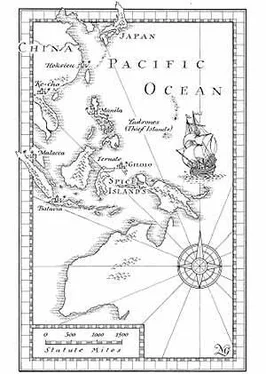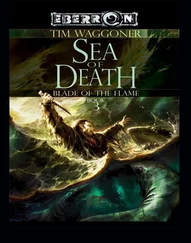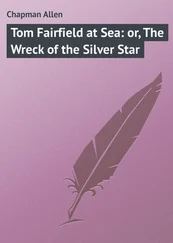‘But didn’t you think of the risk when you hurled yourself forward so blatantly?’
‘I worried that my backsword would shatter against such wonderfully wrought steel. But in the end it did the job for me.’ He looked across to Dan as he approached them. ‘Here’s our pilot now. Looks like he got his job done as well.’
The Miskito had spent the last half-hour perched out on the bowsprit, peering down into the water. He had been conning the ship along the channel, giving hand signals to the men at the helm. As usual, he looked very self-composed.
‘Safely clear?’ asked Jezreel.
‘No more coral heads I could see, and after three days of going out to strike fish on the reef, I know the channel well enough to say that we are finished with it.’
Jezreel turned to Hector. ‘So it’s up to you now. You’re still our navigator, even though the fancy topknot made trash of your charts and backstaff. Where do you think we should go?’
‘We still have our compasses, so we can retrace the same course that brought us here,’ Hector answered without hesitation. He had been mulling over the problem from the moment the Nicholas had weighed anchor.
‘You mean we head back towards the Thief Islands?’
‘With Dan to help me, it’ll take only a couple of days to make a replacement backstaff and I’ve still got the almanac. So I’ll soon be able to fix our latitude.’
Jezreel gave Hector a shrewd look. ‘Have you come round to our way of thinking that we might find Maria?’
Hector felt uncomfortable and bewildered. He knew he owed a debt to his friends. Their scheming had brought his search for the woman he loved much farther forward. Yet as the possibility of reaching the Ladrones grew stronger, he had begun to have doubts. He secretly dreaded what he’d find in the islands. Maybe Don Alonso in Valdivia had been wrong, and Maria’s employer had never taken her to the islands and she was still in Peru. Or Maria had moved on and was no longer there. Worse, some misfortune might have befallen her. There were so many hazards in Spain’s far-flung colonies – fevers, unknown diseases, sudden contagions – and few places could be more remote than the Ladrones. If Maria fell sick in such a place, there’d be no doctors, only local remedies, and her death would have been unremarkable. Except to him.
And even if he did find Maria, how would she respond to him after all this time? Maybe she’d changed her mind or had forgotten him for another man. Everything was so uncertain. The more he tried to understand his feelings about her, the more confused he became and the less inclined to share his misgivings.
‘Maybe Maria won’t even recognize me if we do ever find her,’ he mumbled.
Eaton called for him from the quarterdeck, and Hector was grateful to break off the conversation and make his way to where the captain was in conference with the quartermaster.
‘Lynch, the quartermaster thinks we should return on the same course that brought us here.’
‘I agree. In a couple of days I’ll have a replacement backstaff. Dan can help me. He’s clever with his hands. And I have the almanac.’
‘Do you remember anything from that chart that was destroyed? Any details that might help?’
Hector shook his head. ‘No. But I do know the right latitude for the Ladrones. Our safest course is to sail south until we reach that parallel, then turn west until we strike the islands. They should lie across our track.’
‘Let’s hope we don’t overrun them,’ said Eaton. ‘We’ve only enough water for ten days, even on short allowance.’
The Nicholas ’ abrupt departure under threat from the Ta-yin had been a hectic scramble. There had only been enough time to carry the half-repaired sails back aboard and load two dozen barrels of fresh water. There had been no point in asking the villagers for supplies. They were cowed into submission by their overlords.
‘There’ll be no more lolling about on-shore or easy times,’ said Eaton grimly. ‘When we reach the Ladrones, we keep our weapons and our wits about us, and make it clear that anyone who troubles us suffers.’

HECTOR WAS feeling pleased with himself. As he had predicted, land had been sighted after eight days at sea. The lookout at the masthead had reported two islands side by side. But as the Nicholas drew closer, the dark double hump on the horizon was revealed as a single large island with a high summit at each end and a saddle of land between.
‘Any idea what that place might be, Lynch?’ asked Eaton. Like the rest of the crew, Hector was on the foredeck, trying to distinguish the main features of the shoreline. Behind the usual fringe of coral with its breaking waves was a quiet lagoon maybe a hundred yards across. From its beach a coastal plain extended to a line of reddish-grey bluffs, which marked the boundary of a plateau. Farther on, the ground climbed steeply to rugged highlands. Everywhere was solid green – the feathery tops of coconut palms on the lowland, dense jungle on the bluffs and lower slopes of the mountain, open grassland on the summit.
‘One of the Thief Islands,’ Hector answered. ‘But I have no idea which one.’
‘This time we won’t poke our heads in a noose. We work our way round to the south until we get into a lee. Then we’ll either heave to or drop anchor.’ Eaton walked briskly back to the quarterdeck. A short while later the Nicholas turned and began to follow the coast.
Hector continued gazing at the shore. His eye was caught by a pale triangle among the breakers crashing on the reef. Moments later he saw several more of these triangles, rising and falling to the rhythm of the waves, keeping pace with the ship. It took several minutes for him to realize they were sails. The boats beneath them were either too small or too low in the water to be visible at that distance.
‘Frisky little beggars,’ observed a sailor standing beside him. ‘You’d have thought they’d capsize in that surf.’
The sailing boats quickly worked clear of the surf and set a slanting course to intercept the Nicholas . Hector squinted in surprise. Something was strange. He’d grown accustomed to the pace of movement at sea: the initial glimpse of a distant sail, the long, slow approach as the other vessel drew closer and closer, and the sudden haste in the final moments. But this was different. The cluster of triangular sails, at least a dozen of them, was approaching at the pace of a troop of horsemen moving at a brisk trot. They were catching the Nicholas as if the larger ship was dawdling, instead of pressing forward under full sail.
Hector took another look at the oncoming boats.
They reminded him of a school of hurrying dolphin. They surged across the surface of the sea, spray flying, thrusting the water aside, often showing the full length of their hulls, which were painted a rusty red with white trim.
The sailor beside him let out an admiring whistle. ‘They must be doing twelve knots, maybe more,’ he said. ‘You wonder they don’t thrash themselves to bits.’
Soon the boats were very much nearer. Hector could see their general resemblance to the dugout canoes on the coast of West Africa. Yet these craft were altogether lighter and more finely shaped. Projecting out from the side of each of them was a structure that he had never seen before. A frame of poles supported a second, much smaller hull some six or seven feet away. This second hull acted as a long, narrow float and balanced the vessel so that it skimmed over the tops of the waves instead of ploughing through them.
Several of the Nicholas ’ crew had gone below to fetch their muskets. They were back on deck, loading powder and shot and checking the flints were dry.
Читать дальше









